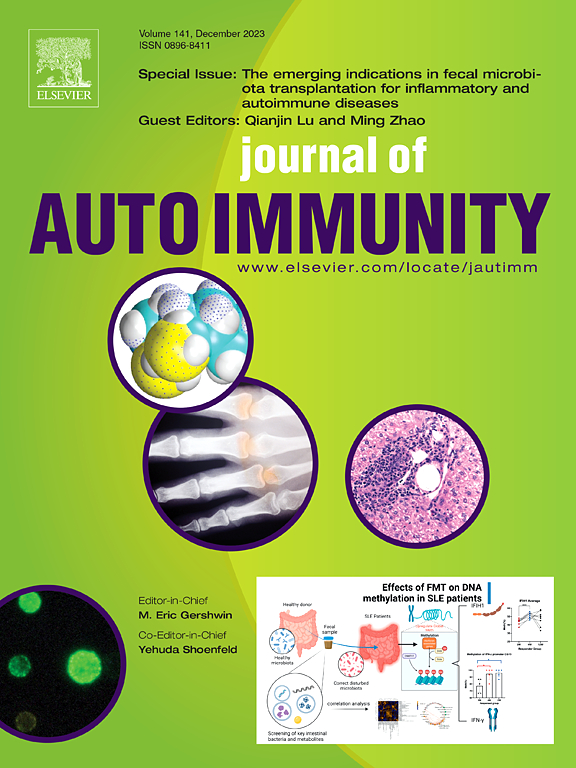Altered glucose metabolism in B cells: Implications for the pathogenesis and treatment of autoimmune diseases
IF 7
1区 医学
Q1 IMMUNOLOGY
引用次数: 0
Abstract
Introduction
Metabolic dysregulation in immune cells is increasingly recognized as a contributing factor in autoimmune diseases. B lymphocytes, which play key roles in immune tolerance and autoantibody production, show altered glucose metabolism. This review examines the role of glucose metabolism in B cell function and its potential impact on autoimmune pathogenesis.
Methods
We reviewed evidence from animal and cell-based studies, together with available clinical findings, on glucose metabolic shifts in various B cell subsets—including naïve, activated, germinal center, plasma, and memory B cells—across major autoimmune diseases. Particular attention was given to glycolysis, oxidative phosphorylation (OXPHOS), and mTOR signaling pathways.
Results
Evidence of altered B cell metabolism, especially increased glycolysis, is most extensively documented in systemic lupus erythematosus (SLE), with growing insights emerging in rheumatoid arthritis (RA), Sjögren's syndrome (SS), and type 1 diabetes (T1D). These metabolic changes are associated with B cell activation, autoantibody production, and broader immune modulation. While many findings are based on comparisons with healthy donors, the understanding of disease-specific metabolic patterns is progressively improving.
Conclusion
Altered glucose metabolism appears to be a common, though variable, feature of B cells in autoimmune diseases. Current data suggest distinct metabolic profiles in SLE, RA, SS, and T1D. Although much of the existing evidence is derived from in vitro and animal studies, ongoing research continues to refine our understanding. Further cross-disease comparative investigations—especially in RA, SS, and T1D—will be instrumental in delineating the unique metabolic adaptations underlying each condition.
B细胞糖代谢改变:自身免疫性疾病的发病机制和治疗意义
免疫细胞代谢失调越来越被认为是自身免疫性疾病的一个促成因素。在免疫耐受和自身抗体产生中起关键作用的B淋巴细胞表现出葡萄糖代谢的改变。本文综述了糖代谢在B细胞功能中的作用及其对自身免疫发病机制的潜在影响。方法:我们回顾了动物和细胞研究的证据,以及现有的临床发现,研究了各种B细胞亚群(包括naïve、活化B细胞、生发中心B细胞、血浆B细胞和记忆B细胞)在主要自身免疫性疾病中的葡萄糖代谢变化。特别关注糖酵解,氧化磷酸化(OXPHOS)和mTOR信号通路。结果B细胞代谢改变的证据,特别是糖酵解增加,在系统性红斑狼疮(SLE)中被广泛记录,在类风湿性关节炎(RA)、Sjögren综合征(SS)和1型糖尿病(T1D)中越来越多的发现。这些代谢变化与B细胞活化、自身抗体产生和更广泛的免疫调节有关。虽然许多发现是基于与健康供体的比较,但对疾病特异性代谢模式的理解正在逐步提高。结论糖代谢改变似乎是自身免疫性疾病中B细胞的一个共同但可变的特征。目前的数据显示SLE、RA、SS和T1D的代谢特征不同。尽管大部分现有证据来自体外和动物研究,但正在进行的研究仍在不断完善我们的理解。进一步的跨疾病比较研究,特别是在RA、SS和t1d中,将有助于描述每种情况下独特的代谢适应。
本文章由计算机程序翻译,如有差异,请以英文原文为准。
求助全文
约1分钟内获得全文
求助全文
来源期刊

Journal of autoimmunity
医学-免疫学
CiteScore
27.90
自引率
1.60%
发文量
117
审稿时长
17 days
期刊介绍:
The Journal of Autoimmunity serves as the primary publication for research on various facets of autoimmunity. These include topics such as the mechanism of self-recognition, regulation of autoimmune responses, experimental autoimmune diseases, diagnostic tests for autoantibodies, as well as the epidemiology, pathophysiology, and treatment of autoimmune diseases. While the journal covers a wide range of subjects, it emphasizes papers exploring the genetic, molecular biology, and cellular aspects of the field.
The Journal of Translational Autoimmunity, on the other hand, is a subsidiary journal of the Journal of Autoimmunity. It focuses specifically on translating scientific discoveries in autoimmunity into clinical applications and practical solutions. By highlighting research that bridges the gap between basic science and clinical practice, the Journal of Translational Autoimmunity aims to advance the understanding and treatment of autoimmune diseases.
 求助内容:
求助内容: 应助结果提醒方式:
应助结果提醒方式:


